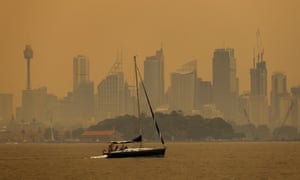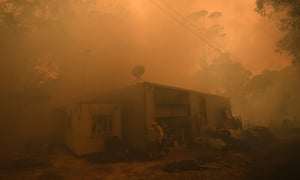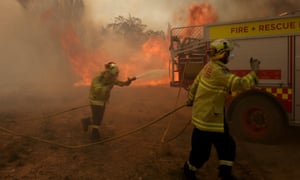Climate experts ‘bewildered’ by government ‘burying their heads in
the sand’, and say bushfires on Australia’s east coast should be a
‘wake-up call’
Leading scientists have expressed concern about the lack of focus on the climate crisis as bushfires rage across New South Wales and Queensland, saying it should be a “wake-up call” for the government.
Climate experts who spoke to Guardian Australia said they were “bewildered” the emergency had grabbed little attention during the final parliamentary sitting week for the year, which was instead taken up by the repeal of medevac laws, a restructure of the public service, and energy minister Angus Taylor’s run-in with the American author Naomi Wolf.
Escalating conditions on Thursday and Friday led to dozens of out-of-control bushfires, including in the NSW’s Hawkesbury region, where a fire at Gospers Mountain merged with two other blazes burning in the lower Hunter on Friday.
Sydney has been blanketed with a thick smoke haze
that health officials said had led to a 25% increase in people
presenting in emergency departments for asthma and breathing problems.Climate experts who spoke to Guardian Australia said they were “bewildered” the emergency had grabbed little attention during the final parliamentary sitting week for the year, which was instead taken up by the repeal of medevac laws, a restructure of the public service, and energy minister Angus Taylor’s run-in with the American author Naomi Wolf.
Escalating conditions on Thursday and Friday led to dozens of out-of-control bushfires, including in the NSW’s Hawkesbury region, where a fire at Gospers Mountain merged with two other blazes burning in the lower Hunter on Friday.

"The government chooses the points they want to discuss in the parliament and the fact they haven’t chosen to discuss [bushfires] sends a message to me."
“They dismissed it from the outset and haven’t come back to it since.
“They’re burying their heads in the sand while the world is literally burning around them and that’s the scary thing. It’s only going to get worse.”
Mark Howden, the director of the Australian National University’s Climate Change Institute and a vice-chair of the Intergovernmental Panel on Climate Change (IPCC), said while the fires were raging on, “the commentary in terms of climate change has very much died down”.
“Yesterday they did a public service reshuffle, or there was medevac, or the ‘union-busting’ bill,” he said.
“The government chooses the points they want to discuss in the parliament and the fact they haven’t chosen to discuss it sends a message to me.
“Essentially, it’s a question of priorities, that’s how I interpret it.”
Howden said the general public had already joined the dots about the rising number of extreme weather days that brought heat, wind and dry conditions and high fire danger.
He said all of the indicators of fire danger were starting to change and the effects of this were evident through increased frequency of fires, larger fire areas, more severe fires, fires burning in ecosystems not prone to fire and a longer fire season.
Euan Ritchie, a wildlife ecologist at Deakin University, said he was “deeply concerned” that the extent and severity of the current fires meant that ecosystems that shouldn’t be burning – such as rainforests in NSW – were on fire.
“It’s another example of failure to act on climate change, which is hurting people’s lives as well as nature,” he said.
“There needs to be increased attention on the impact of climate change and it’s relationship with fire and how that threatens humans as well as nature and the environment.”

He said Morrison had still failed to meet with emergency leaders, however both Taylor and the emergency services minister David Littleproud have now done so.
Rice said the government was “failing to respond” to the climate crisis and to the “health emergency” created by toxic air around greater Sydney.
“This has to be a wake-up call to the federal government,” he said.
Rice said the Reserve Bank, medical practitioners, councils and mayors, emergency leaders and students were just some of the people who had made recent public pleas for a response.
“All walks of life in Australia are demanding action,” he said.
.png)

No comments:
Post a Comment